Sometimes, as in last week’s BookNotes, I try to tell you a bit about the authors of a particular book, explaining why their past work remains important, and why a new book (in that case, Beyond the Modern Age: An Archeology of Contemporary Culture by Bob Goudzwaard & Craig Bartholomew) is so very urgent. I do my best to explain about it in some detail, making a case that at least some of our readers should purchase it right away. Such reviews are sometimes a bit sprawling, I’d admit.
This time, without much ado, I’ll list 10 recent books about church life that seemed particularly interesting or useful. We have a large selection of other titles in this area, so give us a shout if we can help you or your congregation. All listed below are in stock here in Dallastown, on sale at 10% off if you want us to send them. Just use the link to the order form page at the end of this column.
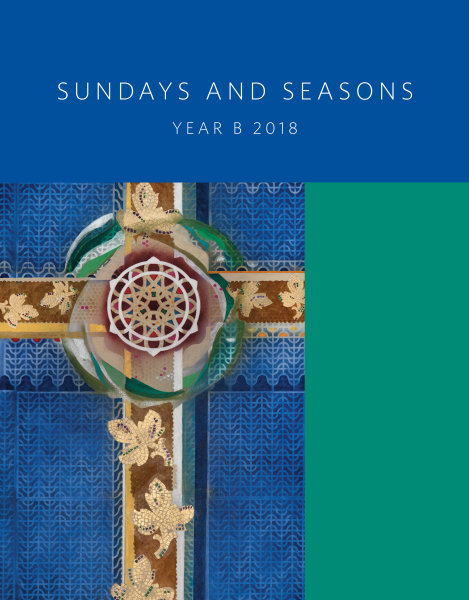
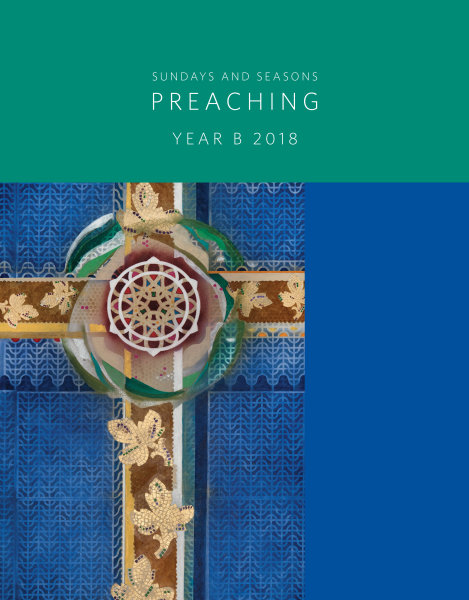 Sundays and Seasons: Guide to Worship Planning Year B 2018 (Augsburg Fortress) $39.00
Sundays and Seasons: Guide to Worship Planning Year B 2018 (Augsburg Fortress) $39.00
Sundays and Seasons Preaching Year B 2018 (Augsburg Fortress) $29.00
These are very popular among liturgical worship planners and lectionary preachers — as the publisher says in their description of the worship planning one, “Worship planners and leaders, preachers, presiding ministers, worship committees, musicians, visual artists, sacristans and altar guilds, and those who create congregational worship folders, will find an indispensable companion in Sundays and Seasons as they prepare for worship each week.”
We have nearly any series like this done by mainstream denominational publishers that open up the annual lectionary texts for creating liturgies with relevant, thematic prayers and Biblical and preaching insights for the lectionary texts — Feasting on the Word, the Abingdon Preaching Annual (this new edition for 2018 is edited by Scott Hoezee), the Abingdon Worship Planning Guide, and books of lectionary based prayers form authors like Yvonne Baylor, Ruth Duck, or the series done by David Sparks for Woodlake Press (such as Pastoral Prayers to Share.) There are more.
The two in the Sundays and Seasons set, though, are done annually by the ECLA publisher Augsburg Fortress so are a bit on the sophisticated end, liturgically. They are exceedingly highly regarded. There are indexes and many great features — more than you expected — for anyone planning services, choosing music, or creating messages. These for the next church year (which, of course, starts in December 2017 with Advent and goes in to most of 2018) were just released and we are happy to offer them to you.
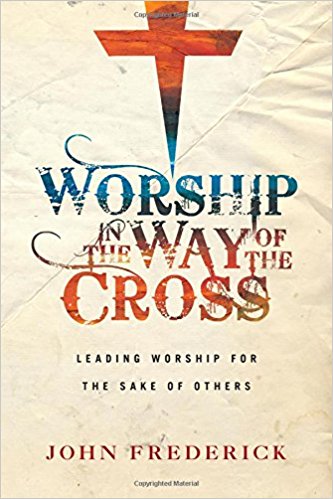 Worship in the Way of the Cross: Leading Worship for the Sake of Others John Frederick (IVP) $18.00 It is not a cheap shot, although it is increasingly said, that “worship” must be more than “just the music, an onstage performance that puts the spotlight on the worship leader.” I know many worship leaders who are essentially musicians who lead songs of praise and they don’t want to be in the spotlight, but the very structure of the worship event puts them there. (In other traditions it is the preacher who is in the center of the up-front activity and the church becomes very preacher-centric.) In any event, whether one is in a hip urban church plant or an old school, denominational preacher in a smaller church, the question of what constitutes artful, high-quality, and theologically faithful worship is pressing. It needs to be revisited regularly, and — given that it is one of the most important and routine things local churches do — I’m surprised that pastors and worship leaders don’t read and study and revisit this topic regularly. Maybe they do, but we don’t sell that many of the oodles of books on worship that we stock, and I wish they sold better. I wish ordinary folks who attend worship and participate would read up a bit on what it’s all about.
Worship in the Way of the Cross: Leading Worship for the Sake of Others John Frederick (IVP) $18.00 It is not a cheap shot, although it is increasingly said, that “worship” must be more than “just the music, an onstage performance that puts the spotlight on the worship leader.” I know many worship leaders who are essentially musicians who lead songs of praise and they don’t want to be in the spotlight, but the very structure of the worship event puts them there. (In other traditions it is the preacher who is in the center of the up-front activity and the church becomes very preacher-centric.) In any event, whether one is in a hip urban church plant or an old school, denominational preacher in a smaller church, the question of what constitutes artful, high-quality, and theologically faithful worship is pressing. It needs to be revisited regularly, and — given that it is one of the most important and routine things local churches do — I’m surprised that pastors and worship leaders don’t read and study and revisit this topic regularly. Maybe they do, but we don’t sell that many of the oodles of books on worship that we stock, and I wish they sold better. I wish ordinary folks who attend worship and participate would read up a bit on what it’s all about.
Well, here is one that really should be on the short list of any library of books about worship. It develops the theme made clear in the title — the shape of worship that is formed by the way of the cross — with Biblical exposition and practical insights. As it says on the back cover, Frederick (who has a PhD from St. Andrews in Scotland, by the way) “explores a cruciform theology of worship as the cross demonstrates the nature of God, worship in the way of the cross transforms us into the image of God who is love.” Let that sink it: this paradigm for thinking about workshop helps us become deeper disciples because “worshipers and worship leaders alike can come to embody the other-centered humility of Christ.”
I like that it promises to help guide “how worship leaders and pastoral staff relate to one another and for renewing the artistic output of the church.”
Michael Card — who is always worth listening to — says,
This is a book the American church has been hungering for a very long time. It is a wonderfully balanced and biblical engagement with contemporary culture and the very church… I believe it will deeply impact the worship life of any church that takes the time to engage with it.
If you read our BookNotes column regularly, you know that we have been long-time fans of the serious New Testament work of our friend Michael Gorman (of St. Mary’s Ecumenical Institute in Baltimore, MD.) You should know his scholarly book Cruciformity which explores a New Testament Pauline spirituality of radical discipleship.) He, of course, likes this book.
Read what Gorman writes on the back:
In this readable yet theologically rich book, John Frederick sharply challenges numerous misguided contemporary understandings of worship, the church, and the Christian life. He replaces them with a vision of cross-shaped worship and it’s result: communities of Christlike disciples living and loving for the sake of the world. Pastors, worship leaders, and all concerned about worship need to engage this book seriously.
Last, to understand the importance and some of the value of this volume, listen to Robbie Castleman, author of Story Shaped Worship. I like her insights here:
Worship in the Way of the Cross offers insights into the importance of story and affirms the congregational community as a matrix for discipleship… Frederick fosters critical thinking and challenges worship leaders to elevate excellence and service to the congregations a countercultural witness in the world.
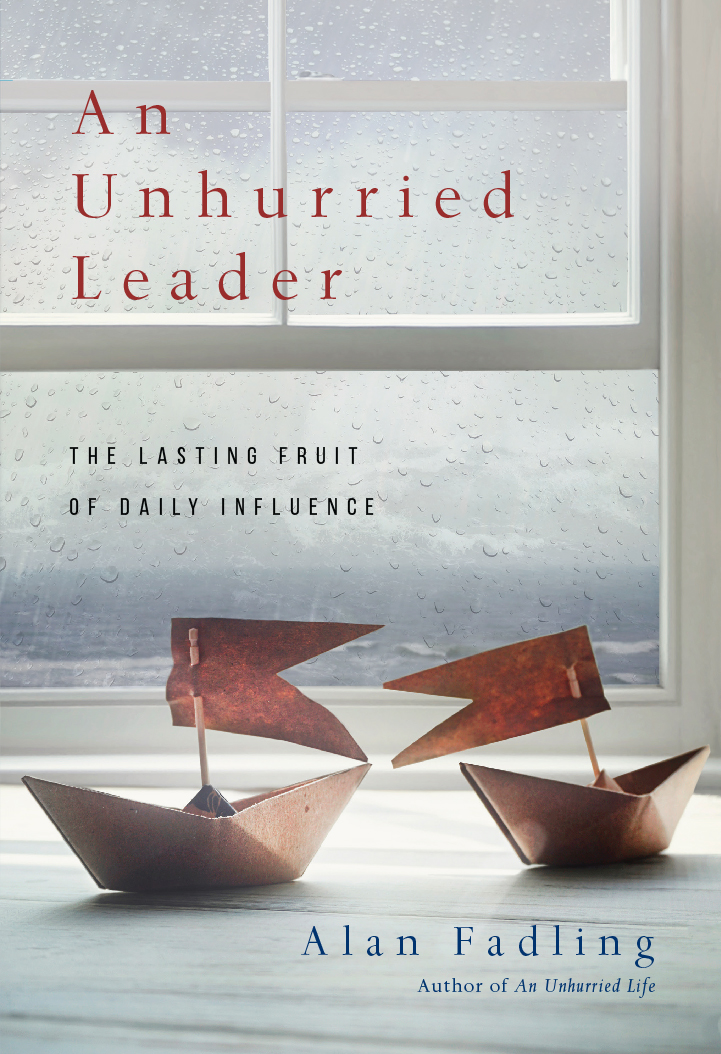 An Unhurried Leader: The Lasting Fruit of Daily Influence Alan Fadling (IVP) $20.00 This is a must read for pastors or other church leaders or anyone involved in ministry, or in leadership of any kind. What a great, great idea for a book, and what a fine writer to do it.
An Unhurried Leader: The Lasting Fruit of Daily Influence Alan Fadling (IVP) $20.00 This is a must read for pastors or other church leaders or anyone involved in ministry, or in leadership of any kind. What a great, great idea for a book, and what a fine writer to do it.
Perhaps you have seen this author and his previous book, The Unhurried Life, at book tables or in the shop (if you visit us here) as we’ve promoted it often. It is a positive, important book that many have appreciated.
Fadling is a fine writer and his book resonated with many as he explored a “grace-paced” lifestyle. Our hectic and hurried ways leave trouble in its wake and isn’t, finally, helpful for us or those around us. He invited us to and outlined a less stressed way of being. Here, in this brand new book applying his vision to those in leadership and ministry, he asks us to resist the temptation, 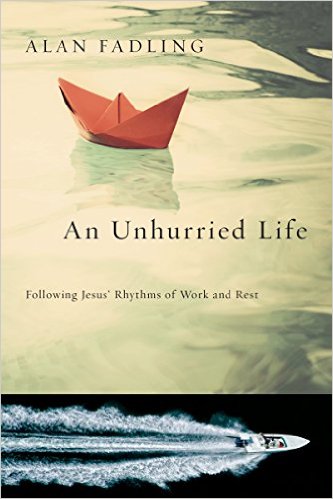 when faced with so many responsibilities and opportunities to do good to “frantically take control of situations in hopes of making good things happen.” Rather, he offers good examples and guidance for alternative ways to lead; as Mindy Caliguire puts in, “to lead from a place of overflow rather than deficit.”
when faced with so many responsibilities and opportunities to do good to “frantically take control of situations in hopes of making good things happen.” Rather, he offers good examples and guidance for alternative ways to lead; as Mindy Caliguire puts in, “to lead from a place of overflow rather than deficit.”
I know I need this and I bet you do to. It is too new for me to have read it yet, but the ten chapter titles are intriguing and seem serious and important. The footnote citations are fabulously interesting, so I know it will be a well written, thoughtful book that you will enjoy. What does “unhurried influence” look like? Can you be an “unhurried leader”? If you long for that, I’m sure you’ll need some help. This may be transformative for you.
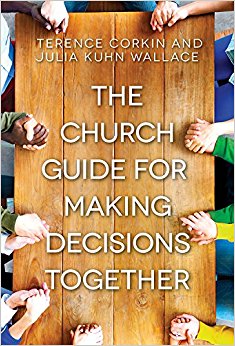 The Church Guide for Making Decisions Together Terence Corkin & Julia Kuhn Wallace (Abingdon Press) $22.99 Allow me to suggest that this is a very, very important book for anyone on a journey to put into place more — what to call it — spiritual ways of being together as the Body of Christ. Much has been written about how the church is not just any institution and we ought not borrow without caution any old strategic plan from the world of business or corporations. We need uniquely Christian spiritual practices to guide and shape us to be the kind of people God desires, and to be in tun with the new work the Holy Spirit is doing in and through us. So, yes, we all know that — even if we are slow to enact fresh ways of doing stuff day by day in our church. I know church polity courses that still teach from Roberts Rules of Order, which, I suppose, isn’t a bad thing, if it is supplemented by organizational practices informed by more faith-based, spiritual disciplines.
The Church Guide for Making Decisions Together Terence Corkin & Julia Kuhn Wallace (Abingdon Press) $22.99 Allow me to suggest that this is a very, very important book for anyone on a journey to put into place more — what to call it — spiritual ways of being together as the Body of Christ. Much has been written about how the church is not just any institution and we ought not borrow without caution any old strategic plan from the world of business or corporations. We need uniquely Christian spiritual practices to guide and shape us to be the kind of people God desires, and to be in tun with the new work the Holy Spirit is doing in and through us. So, yes, we all know that — even if we are slow to enact fresh ways of doing stuff day by day in our church. I know church polity courses that still teach from Roberts Rules of Order, which, I suppose, isn’t a bad thing, if it is supplemented by organizational practices informed by more faith-based, spiritual disciplines.
And so, a book like this becomes an extraordinary gift, a must-read, even, to either counter our overly secularized view of church practice, or at least to supplement whatever guidance our denomination or tradition already gives us. The Church Guide for Making Decisions really does give a “new way of making decisions” that should be read alongside important recent books such as Ruth Haley Barton’s wonderful Pursuing God’s Will Together: A Discernment Practice for Leadership Groups (IVP; $21.00) and Elizabeth Liebert’as The Way of Discernment: Spiritual Practices for Decision Making (WJK; $18.00.)
The authors of The Church Guide for Making Decisions Together themselves each have notable experience in both small decision making bodies and within smaller, local, nonprofit and church groups as well as larger, national-level organizations. Terence Corkin is an ordained minister in the United Church of Australia (UCA) and has served for fifteen years as the general secretary and CEO of their Assembly. He consults on consensus decision-making for many congregations and judicatories in the US, Europe, and Australia.
Julia Kuhn Wallace is a layperson in the United Methodist denomination who has served on staff with their impressive General Board of Discipleship at their national headquarters in Nashville. Her areas of expertise include mediating disputes, assessing congregational vitality, transforming conflict, choosing viable options for declining congregations, and leading strategic visioning and change.
Every church I know has had to deal with conflict, and some conflict develops, it seems, in what might be an otherwise exciting time of strategic planning. Often, it seems, explorations of congregational vitality or capacities for adaptive change bring out some deep questions and hard stuff.
As one denominational leader put it on the back cover, “We are often mired in decision-making processes that limit our thinking and dreaming — processes that emphasize making legislative decisions over community discernment. Corkin and Wallace offer a better way…
David Alan Bard continues,
This book is intellectually sharp, eminently practical, insightful in its understanding of Christian faith, and quite simply a joy to read.
I think this book will be appreciated by those looking for what one called “a kinder, gentler, more faith-grounded way of making decisions and building consensus without our faith communities.” It will help us find ways of making decisions in the church that are more collaborative and more life giving. It says that “form follows function” and that all our work should “be caught up into the saving purposes of God for all creation.”
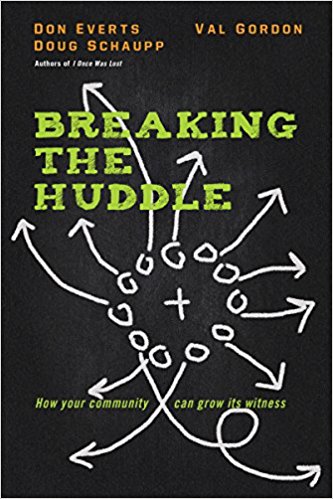 Breaking the Huddle: How Your Community Can Grow Its Witness Don Everts & Doug Schaupp (IVP) $16.00 This is a surprisingly excited book, a really interesting read that is based on some creative research and new descriptions of sorts of communities and stages of faith development within congregational life.
Breaking the Huddle: How Your Community Can Grow Its Witness Don Everts & Doug Schaupp (IVP) $16.00 This is a surprisingly excited book, a really interesting read that is based on some creative research and new descriptions of sorts of communities and stages of faith development within congregational life.
“What kind of community are you?” it asks. Even though we believe in outreach, most communities tend to focus on our own needs.
So this book argues that we end up becoming “insular groups without many relationships with outsiders. So evangelism is occasional and conversions are rare.”
Want break out of the huddle?
Here is what you may want to know. Everts is a popular, colorful author who has written so great books, such as Jesus with Dirty Feet and the tremendously energetic call to discipleship called Go and Do. He is now minister of outreach at a Presbyterian Church in Chesterfield Missouri and his co-authors (who work for InterVarsity Christian Fellowship) have together written a previous book that was much-discussed among those who do young adult ministry and, particularly, among those who do campus outreach. It was called I Once Was Lost: What Postmodern Skeptics Taught Us About Their Path to Jesus (IVP; $16.00.) In that important book they survey literally thousands of young adults 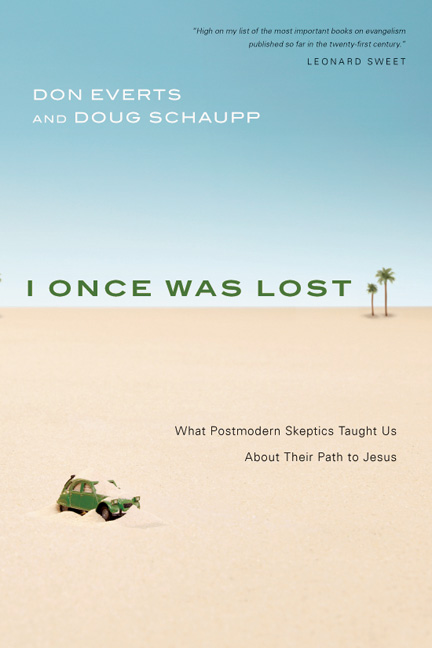 who had come to Christian faith out of an utterly secularized and postmodern background. What were the steps these folks went through to come to a point when the Christian gospel could even be considered as interesting and plausible? What stages did they go through from being disinterested to interested? What were the common paths they took from religiously apathetic (if not out and out skeptical) to becoming a seeker to being one who took the claims of Christ seriously, to actually finding themselves to be Christians? As you might guess, that book documented the role of kind and caring friends that helped seekers navigate these stages of the journey and walked with them towards increasing belief. I Once Was Lost is a one-of-a-kind book and remains a great read for those who are serious about reaching post-Christian young adults with plausible and meaningful and fruitful conversations about deepening faith.
who had come to Christian faith out of an utterly secularized and postmodern background. What were the steps these folks went through to come to a point when the Christian gospel could even be considered as interesting and plausible? What stages did they go through from being disinterested to interested? What were the common paths they took from religiously apathetic (if not out and out skeptical) to becoming a seeker to being one who took the claims of Christ seriously, to actually finding themselves to be Christians? As you might guess, that book documented the role of kind and caring friends that helped seekers navigate these stages of the journey and walked with them towards increasing belief. I Once Was Lost is a one-of-a-kind book and remains a great read for those who are serious about reaching post-Christian young adults with plausible and meaningful and fruitful conversations about deepening faith.
It may not surprise you, then, that they ask here, in similar fashion, what kind of people we must be and become if we are going to move from being an insular church to a more outward focused one, to being a congregation with limited witness activity, to becoming a true inclusive community where conversion and growth from evangelism becomes a new normal.
I agree with Rick Richardson (of Reimagining Evangelism) who says
If you liked I Once Was Lost on the five thresholds of postmodern conversion, you will love Breaking the Huddle, which applies those insights to whole communities, helping them break their inward-focused huddle and ultimately become a conversion movement for the kingdom of God. Who wouldn’t want that?
This is, of course a book about evangelism, although they, gratefully, have a wholistic and truly Biblical vision of the broader understanding of that. It is interesting to me that most books about how to be more comfortable talking about our faith, about doing apologetics or even “inviting people to church” are written to enhance the comfort level and skill sets of individual people who want to be motivated to share a personal witness. Breaking the Huddle stands with that smaller group of books that help congregations and faith communities become fellowships that together are bearing witness and that together are inviting people into experiences of transformation.
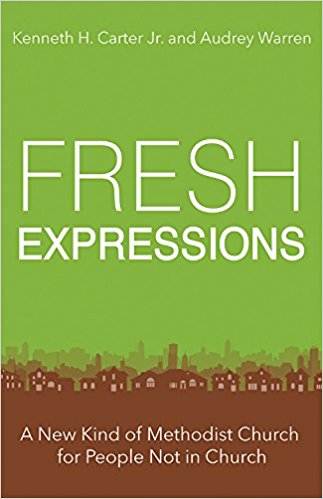 Fresh Expressions: A New Kind of Methodist Church for People Not in Church Kenneth H. Carter Jr. & Audrey Warren (Abingdon Press) $14.99 I’ll say it right away: despite the fact that this has “Methodist” in the subtitle, I truly think it is suitable and valuable for nearly any congregational type. If you are interested in creative outreach, even church planting or para-church ministry, this tells some great stories which you can apply within your own context and theological tradition. I can’t tell you how excited I am that this documents a “wave of new Methodist churches emerging to reach unchurched and dechurched people who live in a culture that is increasingly nonreligious and multi-religious.” And what it is documenting is, in fact, deeply ecumenical. The “Fresh Expressions” movement began in the United Kingdom where it ignited over 3,000 new faith communities.
Fresh Expressions: A New Kind of Methodist Church for People Not in Church Kenneth H. Carter Jr. & Audrey Warren (Abingdon Press) $14.99 I’ll say it right away: despite the fact that this has “Methodist” in the subtitle, I truly think it is suitable and valuable for nearly any congregational type. If you are interested in creative outreach, even church planting or para-church ministry, this tells some great stories which you can apply within your own context and theological tradition. I can’t tell you how excited I am that this documents a “wave of new Methodist churches emerging to reach unchurched and dechurched people who live in a culture that is increasingly nonreligious and multi-religious.” And what it is documenting is, in fact, deeply ecumenical. The “Fresh Expressions” movement began in the United Kingdom where it ignited over 3,000 new faith communities.
There have been other books published in England about the Anglican and Methodist movement that is doing “outside of the typical church” sorts of ministry. From coffee shop Bible studies to worshiping in the outdoors, to ministries of the arts within the art world, these para-church and fresh expressions of church are vibrant, often quite theologically robust, and seems to me to bring a different voice than what some of us hear when we talk about outreach and church planting. That is, I suspect that some church plants in the US are theologically fundamentalist and strict, even if their leaders sport tats and hipster beards and serve craft beers at their Bible studies. Others may be theologically ambiguous, unconnected to a serious theological tradition and are emerging into God knows what. The Fresh Expressions movement offers a thicker sort of spirituality and a theological tone that may be more robust and ecumenical and interesting than the fundamentalists on the one hand or the progressives on the other.
Fresh Expressions has really taken off in the US, and we’ve been privileged and delighted to sell books at some of their events. In the USA, if seems to me, Fresh Expressions are happily ecumenical drawing on connections in several denominations from Baptist to Anglican. Their recent event included a special guest speaker, a Roman Catholic Bishop from Italy was held in cooperation with the Roman Catholic Diocese of Harrisburg and also included speakers from Anabaptist and Eastern Orthodoxy traditions as well.
Anyway, Fresh Expressions by Carter & Warren would make a fine group study for anyone who is serious about God’s mission, who appreciates ecumenical and global tones, and who can extrapolate from the United Methodist stories to your own context. It is one of those rare books that is good for inspiration and motivation, tells lots of upbeat and illuminating stories, and yet has some solid Bible study and is instructional and informative. In just six chapters, this is very nice!
It includes impressive Bible study and well-crafted discussion questions, so it is very well suited for small group use. Endorsements are from Jorge Acevedo (lead pastor of Grace Church, a huge and diverse congregation in Southwest Florida) and Duke Divinity School Dean, Elaine Heath, who commends it nicely.
Listen to Kenda Creasy Dean (professor of Youth, Church, and Culture and Princeton Seminary)
If you’ve felt God calling your church into a new kind of mission but you haven’t been sure how to go about it, this book is a great place to start. Get ready for a dose of hope.
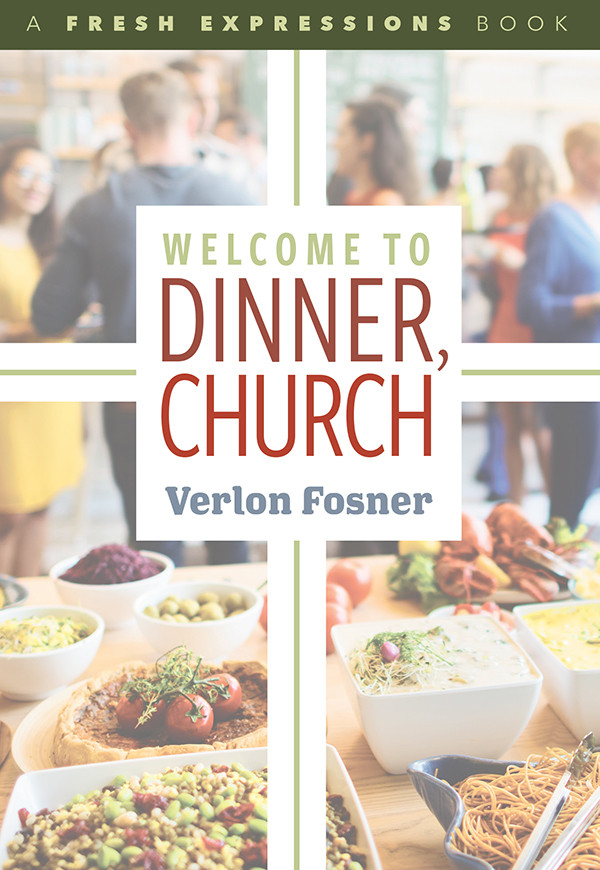 Welcome to Dinner, Church Verlon Fosner (Seedbed) $9.95 We love the fairly recent publishing house created in affiliation with Asbury Seminary in Kentucky. They do great little books, an array of liturgical, Biblical, and spiritual resources for growing Christians. The Fresh Expressions USA movement has partnered with them to publish some books, and we stock them. This one is quite new, and it was the most popular book we had on sale at the Fresh Expressions conference in Harrisburg that we’ve mentioned. Verlon and his lovely wife were at the event, and although they are from the Pacific Northwest (Seattle, Washington) they have done some helpful church consulting here in Pennsylvania. We are delighted to know them and delighted to tell you about this powerhouse of a little book. It is compact and short and perfect for a small group read.
Welcome to Dinner, Church Verlon Fosner (Seedbed) $9.95 We love the fairly recent publishing house created in affiliation with Asbury Seminary in Kentucky. They do great little books, an array of liturgical, Biblical, and spiritual resources for growing Christians. The Fresh Expressions USA movement has partnered with them to publish some books, and we stock them. This one is quite new, and it was the most popular book we had on sale at the Fresh Expressions conference in Harrisburg that we’ve mentioned. Verlon and his lovely wife were at the event, and although they are from the Pacific Northwest (Seattle, Washington) they have done some helpful church consulting here in Pennsylvania. We are delighted to know them and delighted to tell you about this powerhouse of a little book. It is compact and short and perfect for a small group read.
Verlon founded the “Dinner Church Collective” which seems like a Fresh Expression sort of church planting network, a movement focused on Jesus’s own mealtime strategies, and a Biblically theology of food and meals. What would church look like if it was truly revolved around meals, if the practice of eating together was a core practice? Fosner has an Assembly of God background and knows well about church renewal and the power of the Spirit and all kinds of energizing stuff, but nothing has worked as well, he says, until they — nearly out of desperation, in a story he tells in this interesting book — they started doing dinner church.
Leonard Sweet writes this on the back cover:
“What is God up to?” is the question I’m most often asked. “Have you heard of the dinner church movement?” is my most common answer. Read Verlon Fosner to become part of the on f the greatest God-stories of our time.
If after you order this, you like it, order more — we’ve got ’em. But keep an eye open for more Dinner Church resources, including a DVD guide and workbook. Let us know how we can help you launch your own dinner church movement.
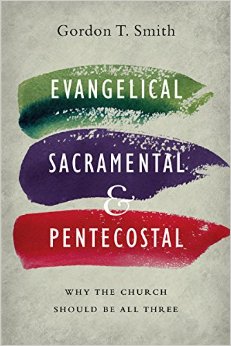 Evangelical Sacramental & Pentecostal: Why the Church Should Be All Three Gordon T. Smith (I(VP) $17.00 I wish I could say more in this short space about how much I value the rich, deep, mature, theological and spiritual writing of evangelical mystic Gordon Smith. He is wise, thoughtful, ecumenical, and I have read almost all of his many good books. (He is now the President of Ambrose University and Seminary in Calgary, Alberta where he also teaches spiritual theology.) He is hard to place as a minister in the Christian Missionary Alliance denomination, but I might suggest that he would appeal to anyone that likes his friends Richard Foster and Eugene Peterson.
Evangelical Sacramental & Pentecostal: Why the Church Should Be All Three Gordon T. Smith (I(VP) $17.00 I wish I could say more in this short space about how much I value the rich, deep, mature, theological and spiritual writing of evangelical mystic Gordon Smith. He is wise, thoughtful, ecumenical, and I have read almost all of his many good books. (He is now the President of Ambrose University and Seminary in Calgary, Alberta where he also teaches spiritual theology.) He is hard to place as a minister in the Christian Missionary Alliance denomination, but I might suggest that he would appeal to anyone that likes his friends Richard Foster and Eugene Peterson.
And so, don’t be scared off when he invites us to be evangelical and sacramental and Pentecostal. We need not identify with the singular overstatement and toxic abuses of these three streams within the greater Body of Christ, but, taken lightly and appropriated wisely and blended together — we don’t have to choose between them, you know! — we can become a church that is truly faithful as the church God has ordained and commissioned.
As the publisher’s good description insists, “The need for an integrated vision of the community as evangelical, sacramental, and pentecostal becomes ever more pressing in our present context.”
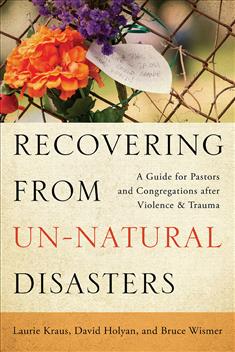 Recovering from Un-Natural Disasters: A Guide for Pastors and Congregations After Violence and Trauma Laurie Kraus, David Holyan, and Bruce Wismer (Westminster John Knox) $20.00 Oh, how sad that we need a resource like this, and oh how great that somebody has compiled such a seasoned and practical guidebook.
Recovering from Un-Natural Disasters: A Guide for Pastors and Congregations After Violence and Trauma Laurie Kraus, David Holyan, and Bruce Wismer (Westminster John Knox) $20.00 Oh, how sad that we need a resource like this, and oh how great that somebody has compiled such a seasoned and practical guidebook.
The key to realizing why you should get this book is in the title, which I hope you picked up: “unnatural disasters.” We stock a few books about the churches role in natural disasters — floods and hurricanes, say — but I do not know of anything like this in print, explaining the role congregations can play after a school shooting or a sexual abuse scandal or a local hostage crisis. Written from a disaster-recovery framework, these authors bring together some remarkable insights, theological views, and tons of practical, doable, actionable ideas so that you know just what to do when a human-caused disaster or trauma strikes. With gun violence, racial incidents, publicly reported suicides, and sexual abuse exposes, becoming all to common in our communities, we need guidance on what to say, when and where, how to help and how to help over the longer term as we seek recovery, healing and hope and perhaps make contributions to local reform and solutions.
These authors are involved in Presbyterian National Response Teams for disaster assistance and Holyan has also been an adjunct teacher at Eden Seminary. Although they are situated within the mainline Protestant tradition, I think any church of any kind should have this, if only to stimulate your own thoughts about leadership — both public and pastoral — if (or should I say when) a local tragedy strikes next.
This handbook for church leaders guides readers through four phases of a response to human-caused disaster which they call (starting the minute it happens) “Devastation and Heroism” and then “Disillusionment” which can give rise to plans for “Reforming” and achieving “Wisdom.” They offer sample worship resources such as laments and prayers and music and sermon suggestions that are appropriate to use during these different phases and periods of trauma and recovery.
Whether you buy this for a pastor or other church ministry staff person, a first responder or public community leader. I think you will be glad you’ve been proactive here, having this resource a bit under your belts for when you may need it next.
BookNotes
DISCOUNT
ANY ITEM MENTIONED
10% off
order here
takes you to the secure Hearts & Minds order form page
just tell us what you want
inquire here
if you have questions or need more information
just ask us what you want to know
Hearts & Minds 234 East Main Street Dallastown, PA 17313
read@heartsandmindsbooks.com
717-246-3333
